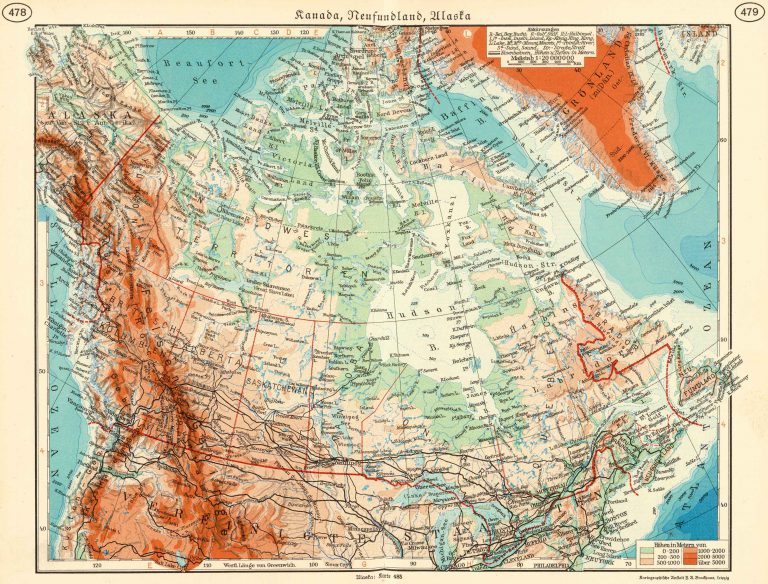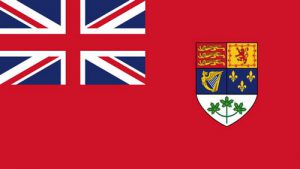
Canada
Policy on Immigration and Refugees
The nation of Canada, which arises in 1867 from several British colonies, only gains its de facto independence from Great Britain in 1931. Its political structure is shaped by differences between the French-speaking population, concentrated in the province of Québec, and the Anglo-Canadian majority, from which is derived most of the country’s political elite. Dependent upon continuous immigration, Canada nevertheless pursues a restrictive policy until the 1960s, based on economic, national and – in part – openly racist criteria.
Since 1923 the immigration authorities have distinguished between “desirable” and “undesirable” immigrants. The latter are Asians, who are prohibited from entering the country by the Chinese Immigration Act, which is applied from 1923 until 1947. What is desired is the settlement of farmers from English-speaking countries as well as from Northern and Central Europe. Hence the primarily urban Central European Jews are effectively excluded. In 1930, as a result of the economic crisis and the devastating droughts in the Canadian prairie, immigration regulations are once again tightened.
The majority of the Canadian population rejects the admission of Jewish refugees in the 1930s. Among the Anglo-Canadian elites, latent antisemitism is rampant, while in French-speaking Québec open antisemitism determines the official policy of the reactionary clerical Union Nationale regime from 1936 on. Although the federal government expresses sympathy for European Jews, when given the chance it still does not allow refugees into the country. Domestically, Canada justifies its policy with its concern over national unity, since the province of Québec, which is pressing for autonomy, would never agree to generous immigration regulations for Jews. About the invitation to the Évian Conference, Canadian Prime Minister William MacKenzie King writes in his diary in March 1938 that Canada, with its great open spaces and small population, must take care not to be the “dog in the manger.” At the same time, one should, he writes, “seek to keep this part of the continent free from unrest and from too great an intermixture of foreign strains of blood.”
Between 1933 and 1945, fewer than 5,000 Jewish refugees find sanctuary in Canada, an extremely small number considering the size of the country. Hence, in today’s Canada, this period is viewed as the low point of Canadian immigration history. These experiences are one reason why Canada has developed one of the world’s most sustainable and liberal refugee policies since the mid 1960s.
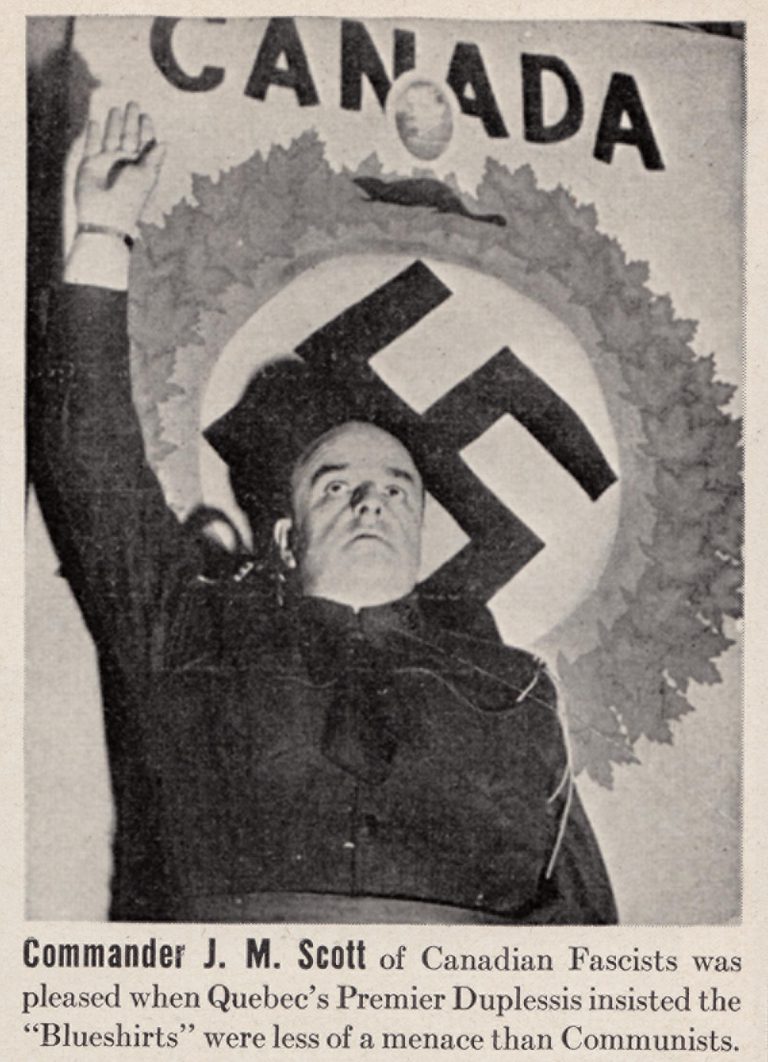
Commander J. M. Scott, Christian National Socialist Party functionary, at a rally in Montreal, 1938, Life, February 21, 1938
In Canada, National Socialist and antisemitic groups are emerging even outside the ethnic German population. In 1938 the Christian National Socialist Party, founded in Québec four years earlier, has 1,800 members. Its identifying logo is a swastika surrounded by maple leaves and crowned by a beaver. The party spreads the myth of a “Jewish world conspiracy,” and its supporters attack Jews and their institutions.
Life, 21. Februar 1938
Commander J. M. Scott, Christian National Socialist Party functionary, at a rally in Montreal, 1938, Life, February 21, 1938
In Canada, National Socialist and antisemitic groups are emerging even outside the ethnic German population. In 1938 the Christian National Socialist Party, founded in Québec four years earlier, has 1,800 members. Its identifying logo is a swastika surrounded by maple leaves and crowned by a beaver. The party spreads the myth of a “Jewish world conspiracy,” and its supporters attack Jews and their institutions.
Life, 21. Februar 1938
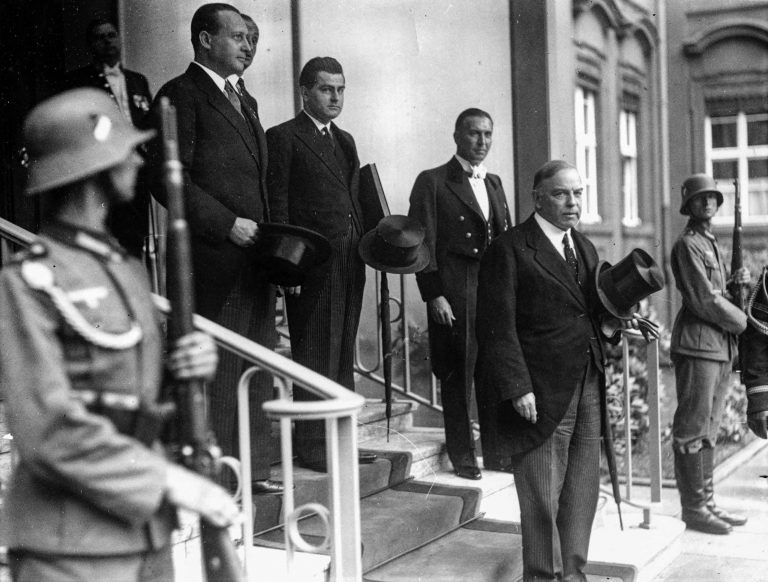
William MacKenzie King leaving the official residence after meeting with Hitler, June 29, 1937
In June 1937, at the suggestion of British Prime Minister Neville Chamberlain, King visits Berlin after attending a conference in London. He is received by Adolf Hitler. Despite all ideological differences, the Canadian Liberal Party member is impressed by Hitler’s personality and views him as a “deliverer of his people” comparable to Joan of Arc.
Bundesarchiv, Koblenz, Bild 183-C09362
William MacKenzie King leaving the official residence after meeting with Hitler, June 29, 1937
In June 1937, at the suggestion of British Prime Minister Neville Chamberlain, King visits Berlin after attending a conference in London. He is received by Adolf Hitler. Despite all ideological differences, the Canadian Liberal Party member is impressed by Hitler’s personality and views him as a “deliverer of his people” comparable to Joan of Arc.
Bundesarchiv, Koblenz, Bild 183-C09362
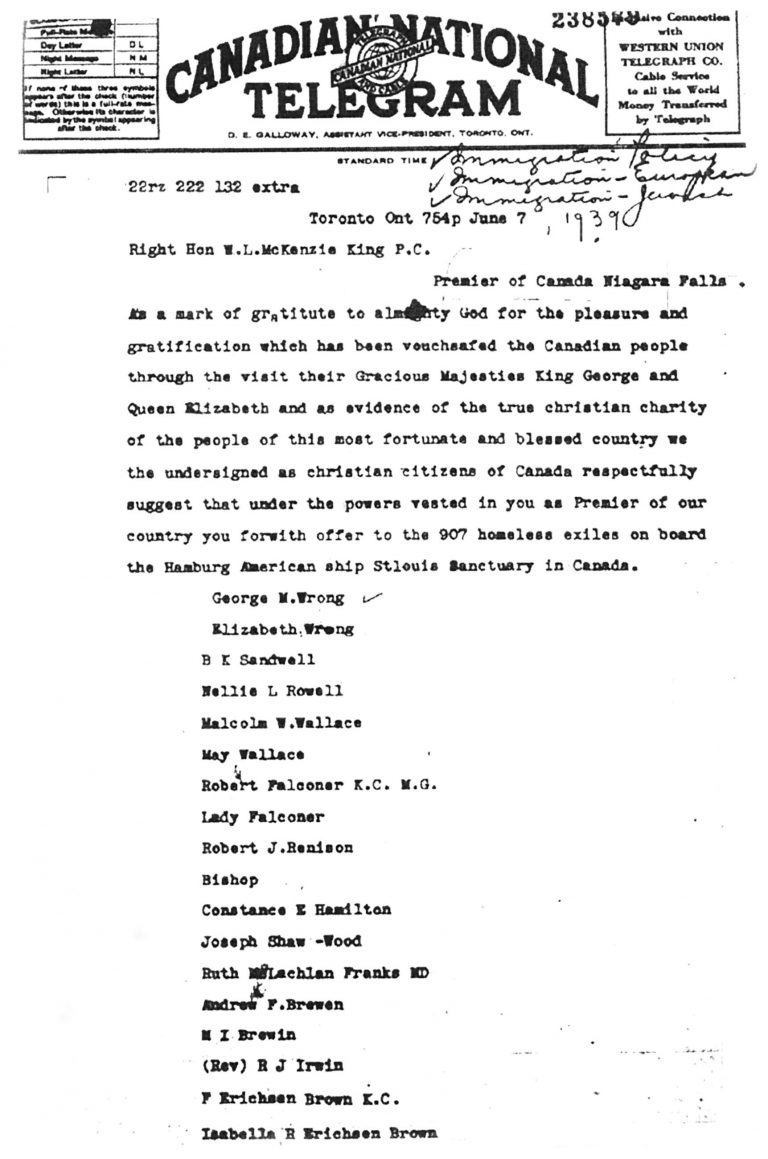
Telegram from prominent citizens of Toronto to Prime Minister MacKenzie King, June 7, 1939, p. 1
The signatories ask that the passengers of the refugee ship St. Louis be allowed to enter Canada, “as evidence of the true Christian charity of the people of this most fortunate and blessed country.” Among them is George MacKinnon Wrong, a pioneer of modern Canadian historiography and father of the Canadian delegate at the Évian Conference.
Library and Archives Canada, Ottawa
Telegram from prominent citizens of Toronto to Prime Minister MacKenzie King, June 7, 1939, p. 1
The signatories ask that the passengers of the refugee ship St. Louis be allowed to enter Canada, “as evidence of the true Christian charity of the people of this most fortunate and blessed country.” Among them is George MacKinnon Wrong, a pioneer of modern Canadian historiography and father of the Canadian delegate at the Évian Conference.
Library and Archives Canada, Ottawa
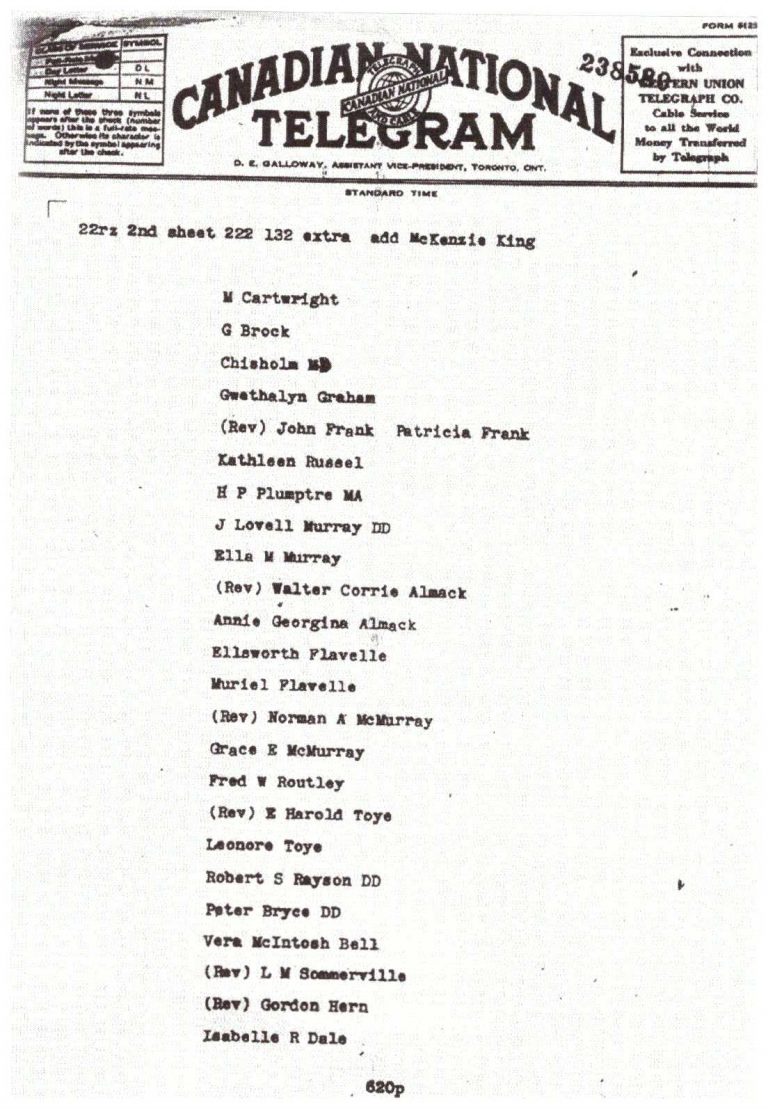
Telegram from prominent citizens of Toronto to Prime Minister MacKenzie King, June 7, 1939, p. 2
The signatories ask that the passengers of the refugee ship St. Louis be allowed to enter Canada, “as evidence of the true Christian charity of the people of this most fortunate and blessed country.” Among them is George MacKinnon Wrong, a pioneer of modern Canadian historiography and father of the Canadian delegate at the Évian Conference.
Library and Archives Canada, Ottawa
Telegram from prominent citizens of Toronto to Prime Minister MacKenzie King, June 7, 1939, p. 2
The signatories ask that the passengers of the refugee ship St. Louis be allowed to enter Canada, “as evidence of the true Christian charity of the people of this most fortunate and blessed country.” Among them is George MacKinnon Wrong, a pioneer of modern Canadian historiography and father of the Canadian delegate at the Évian Conference.
Library and Archives Canada, Ottawa
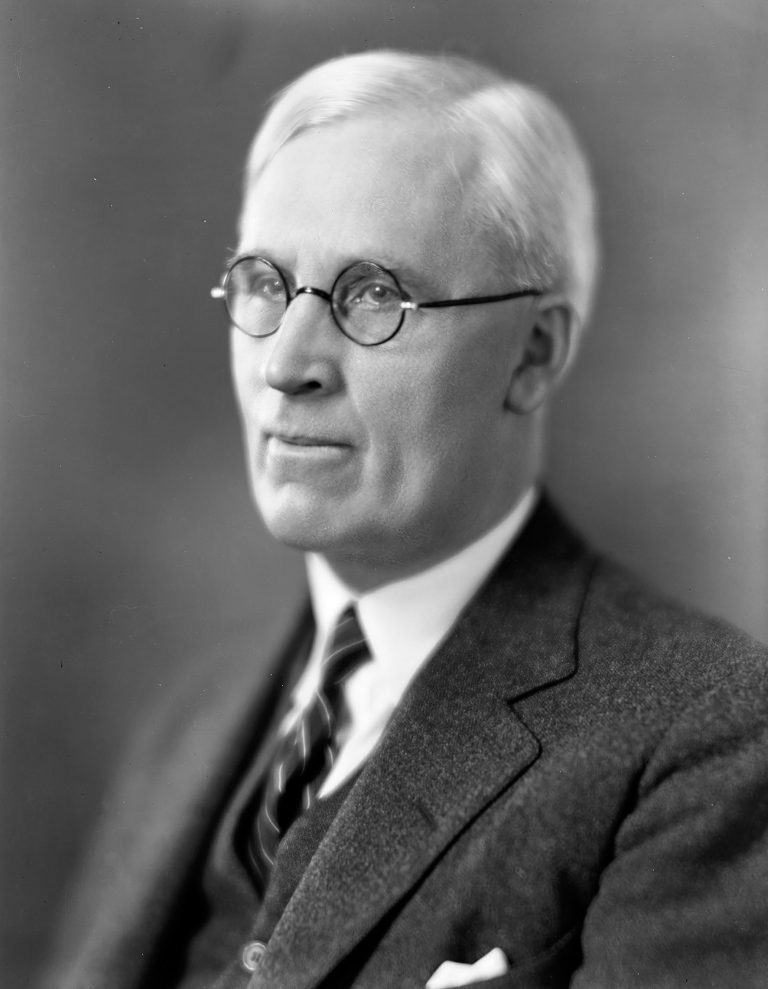
Frederick Charles Blair, November 1932
As director of the immigration department between 1936 and 1943, Blair enforces a refugee policy that is motivated by racism and anti-Semitism. In June 1939 he refuses entry to the passengers of the St. Louis: “No country could open its doors wide enough to take in the hundreds of thousands of Jewish people who want to leave Europe: the line must be drawn somewhere.”
Library and Archives Canada, Ottawa
Frederick Charles Blair, November 1932
As director of the immigration department between 1936 and 1943, Blair enforces a refugee policy that is motivated by racism and anti-Semitism. In June 1939 he refuses entry to the passengers of the St. Louis: “No country could open its doors wide enough to take in the hundreds of thousands of Jewish people who want to leave Europe: the line must be drawn somewhere.”
Library and Archives Canada, Ottawa
Delegation
Humphrey Hume Wrong
* 10 September 1894 Toronto † 24 January 1954 Ottawa
Wrong is from an influential and educated middle-class family in Toronto and studies at elite universities in Canada and England. After service in the First World War and a brief stint teaching history at the University of Toronto, he enters the diplomatic corps in 1928.
A permanent representative of Canada at the League of Nations in Geneva, he becomes his country’s delegate in Évian. There he represents his country’s restrictive refugee policy, even though he personally is skeptical about it. In a letter written at the end of June 1938, he criticizes the inadequate preparation for the conference, whose participants would come together “without knowing much more of what they are expected to do than the croupiers at the local casino.”
During the Second World War Wrong develops a functionalist approach to foreign policy, according to which a country should act like a great power on the international stage in the areas in which it has the resources of a great power. Beginning in 1946, he serves as ambassador to the US. Shortly before his death, he is named Canada’s undersecretary for external affairs.
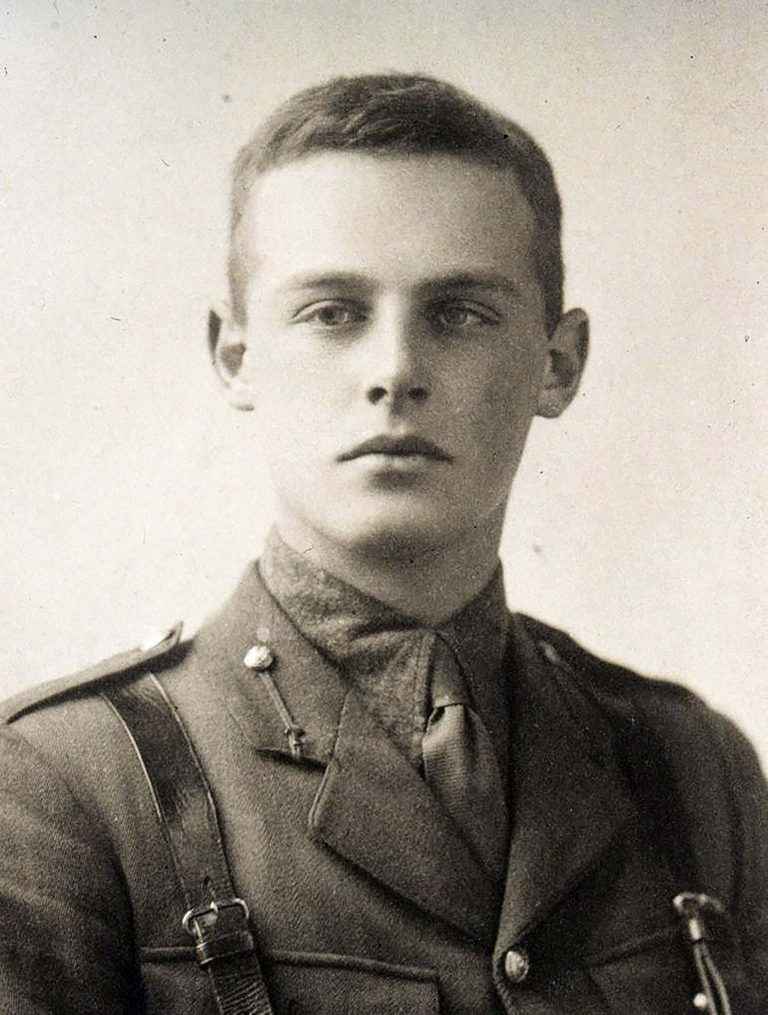
Humphrey Hume Wrong as a soldier in the Oxfordshire and Buckinghamshire Light Infantry, summer 1916
During World War I Wrong takes part in the Battle of the Somme, in which his brother is killed. As a result of this experience, he gives top priority as a diplomat to securing peace. He supports the founding of the United Nations in 1945 and of the North Atlantic Treaty Organization in 1949. Also as ambassador to the US, he advocates for the strengthening of international organizations.
Terence Wrong, New York, NY
Humphrey Hume Wrong as a soldier in the Oxfordshire and Buckinghamshire Light Infantry, summer 1916
During World War I Wrong takes part in the Battle of the Somme, in which his brother is killed. As a result of this experience, he gives top priority as a diplomat to securing peace. He supports the founding of the United Nations in 1945 and of the North Atlantic Treaty Organization in 1949. Also as ambassador to the US, he advocates for the strengthening of international organizations.
Terence Wrong, New York, NY
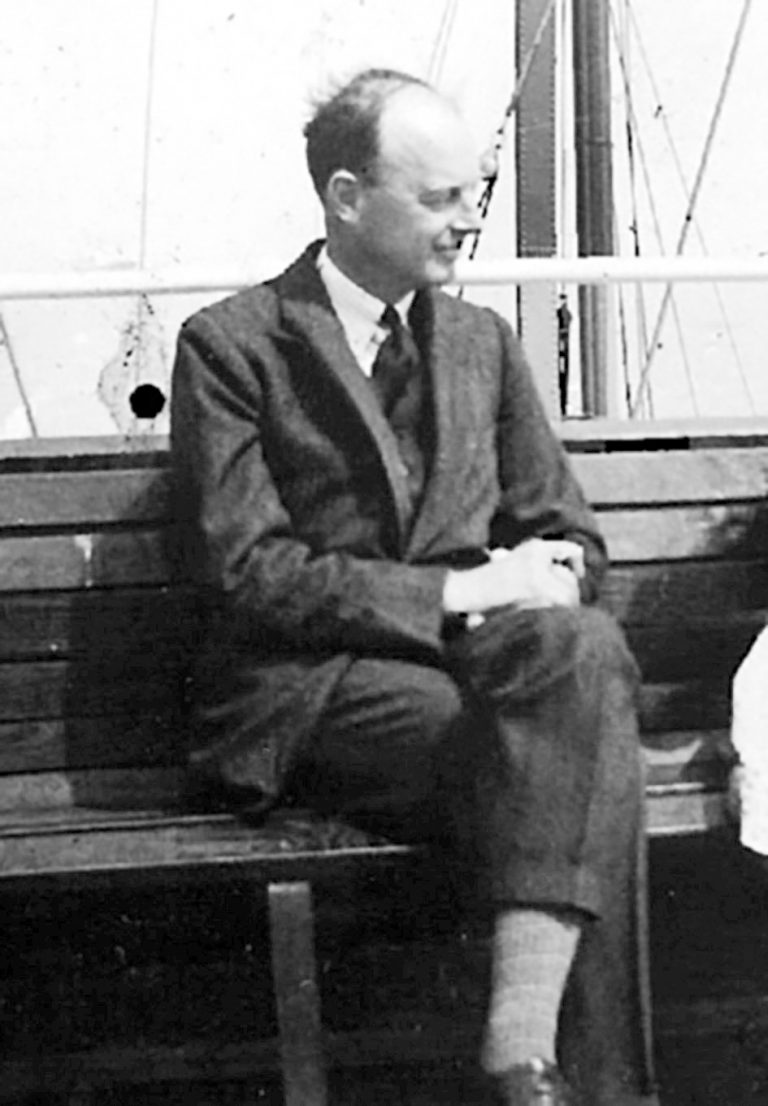
Wrong as a diplomat in Canada House in London, 1940
Terence Wrong, New York, NY
Wrong as a diplomat in Canada House in London, 1940
Terence Wrong, New York, NY
Conference Contributions
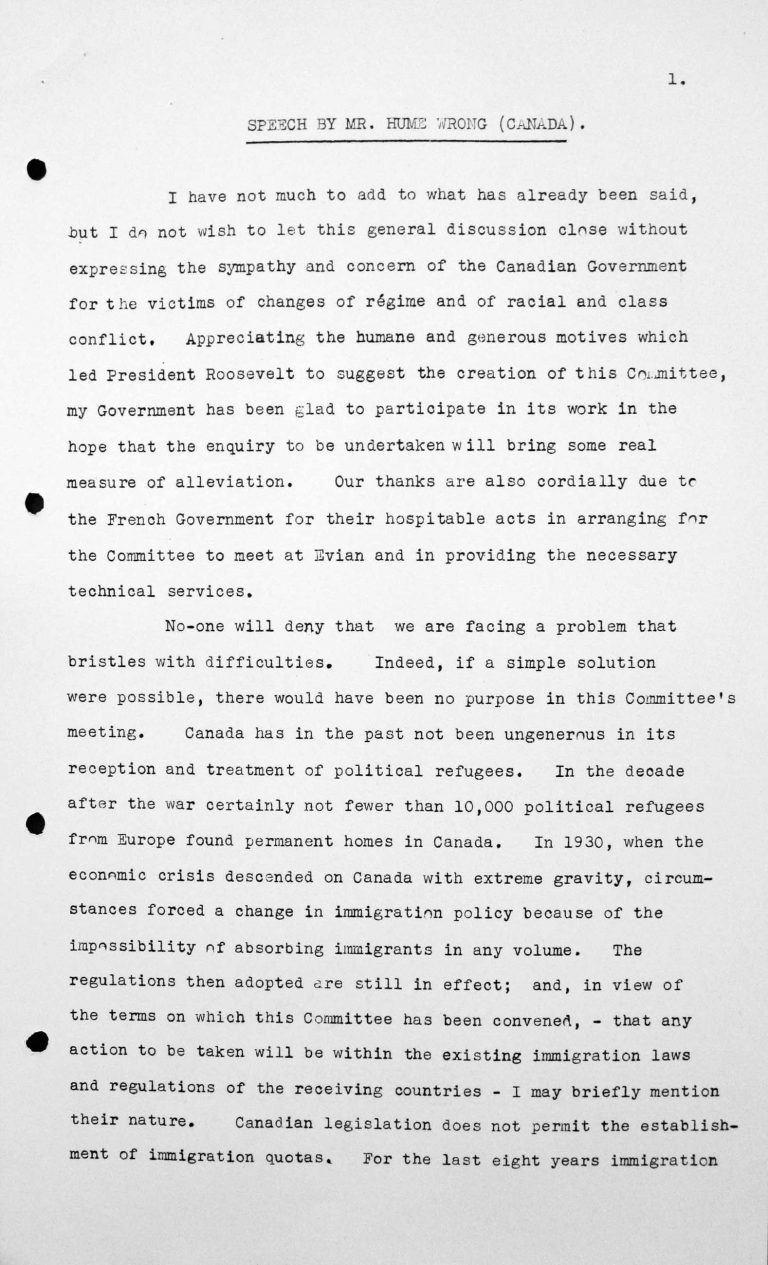
Speech by Humphrey Hume Wrong (Canada) in the public session on July 7, 1938, 3.30pm, p. 1/3
Franklin D. Roosevelt Library, Hyde Park, NY
Speech by Humphrey Hume Wrong (Canada) in the public session on July 7, 1938, 3.30pm, p. 1/3
Franklin D. Roosevelt Library, Hyde Park, NY
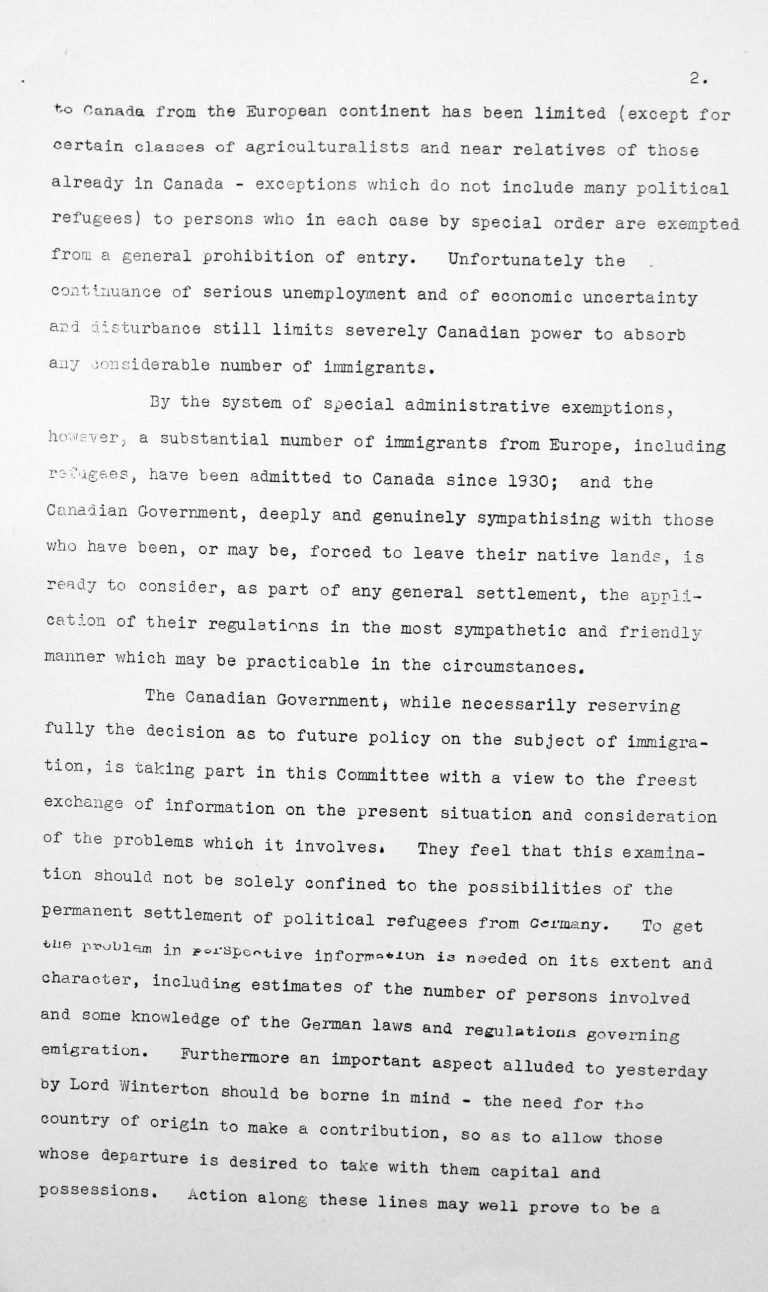
Speech by Humphrey Hume Wrong (Canada) in the public session on July 7, 1938, 3.30pm, p. 2/3
Franklin D. Roosevelt Library, Hyde Park, NY
Speech by Humphrey Hume Wrong (Canada) in the public session on July 7, 1938, 3.30pm, p. 2/3
Franklin D. Roosevelt Library, Hyde Park, NY
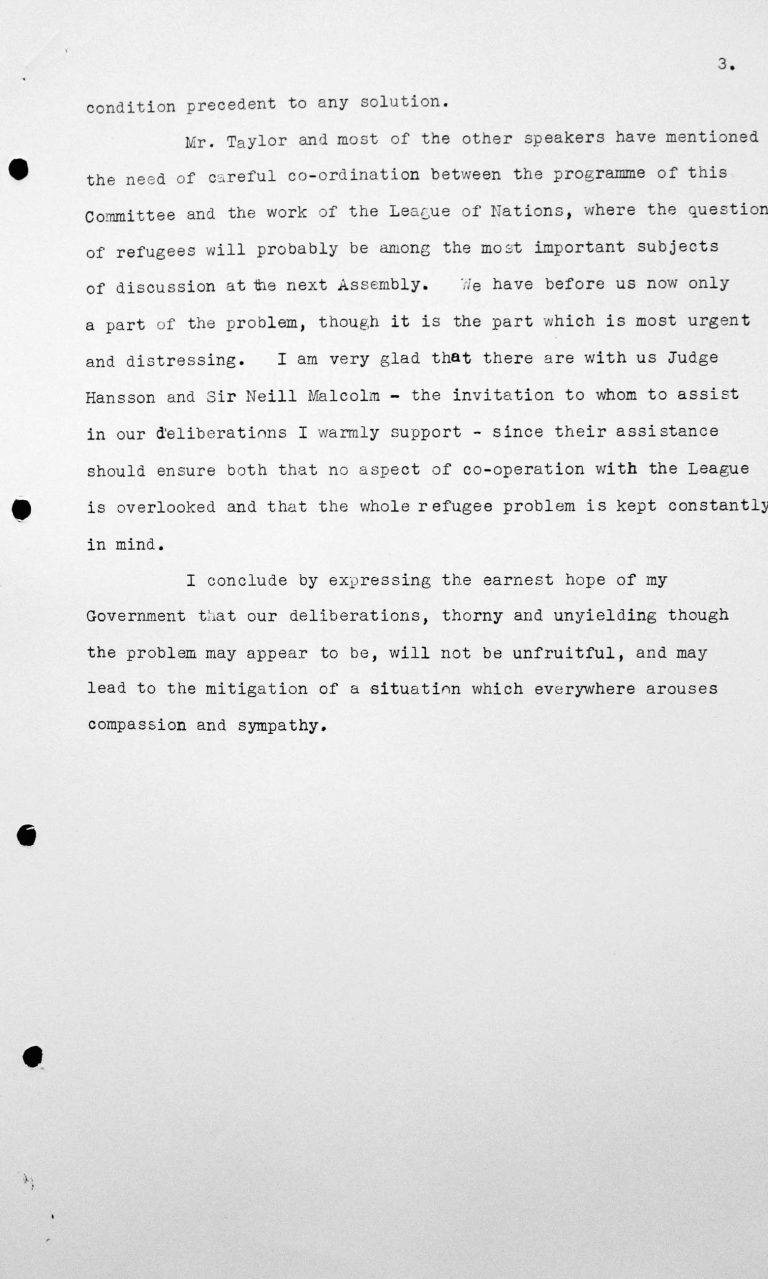
Speech by Humphrey Hume Wrong (Canada) in the public session on July 7, 1938, 3.30pm, p. 3/3
Franklin D. Roosevelt Library, Hyde Park, NY
Speech by Humphrey Hume Wrong (Canada) in the public session on July 7, 1938, 3.30pm, p. 3/3
Franklin D. Roosevelt Library, Hyde Park, NY
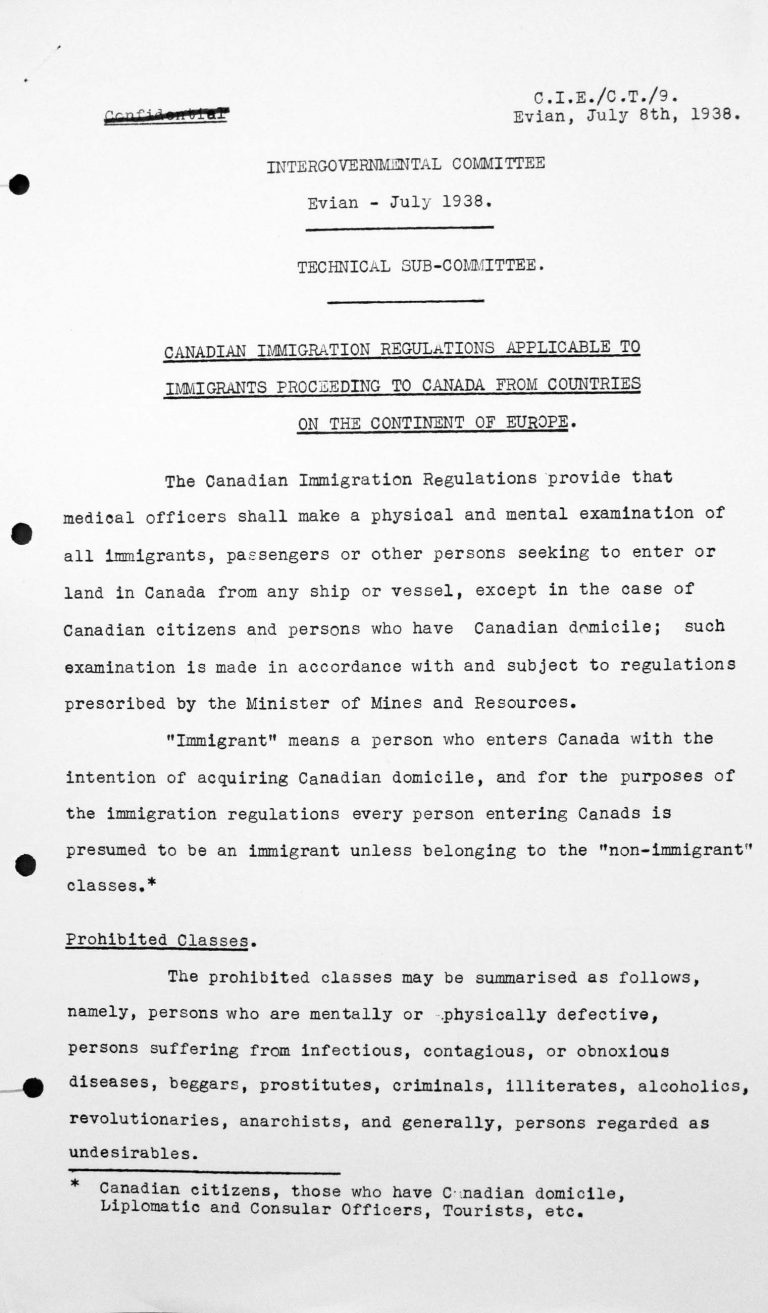
Report for the Technical Sub-Committee on Canadian immigration regulations applicable to immigrants proceeding to Canada from countries on the continant of Europe, July 8, 1938, p. 1/3
Franklin D. Roosevelt Library, Hyde Park, NY
Report for the Technical Sub-Committee on Canadian immigration regulations applicable to immigrants proceeding to Canada from countries on the continant of Europe, July 8, 1938, p. 1/3
Franklin D. Roosevelt Library, Hyde Park, NY
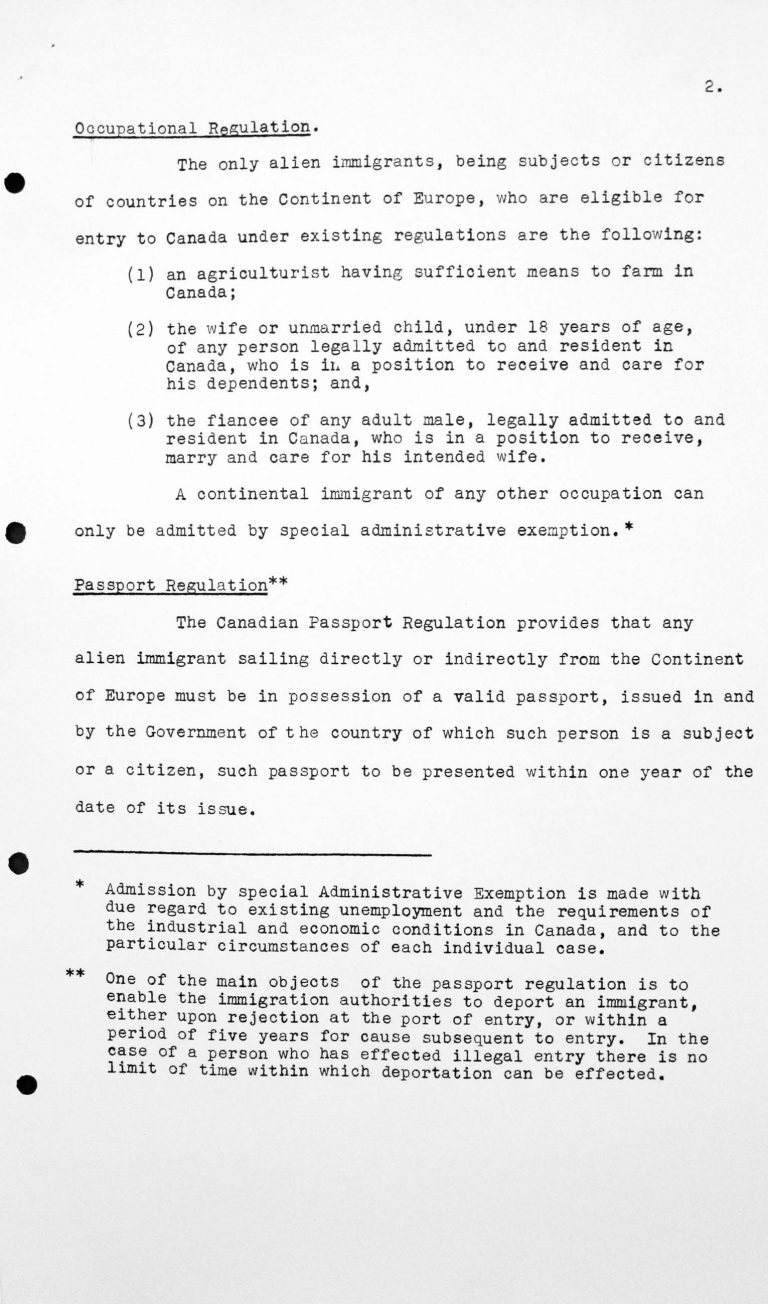
Report for the Technical Sub-Committee on Canadian immigration regulations applicable to immigrants proceeding to Canada from countries on the continant of Europe, July 8, 1938, p. 2/3
Franklin D. Roosevelt Library, Hyde Park, NY
Report for the Technical Sub-Committee on Canadian immigration regulations applicable to immigrants proceeding to Canada from countries on the continant of Europe, July 8, 1938, p. 2/3
Franklin D. Roosevelt Library, Hyde Park, NY
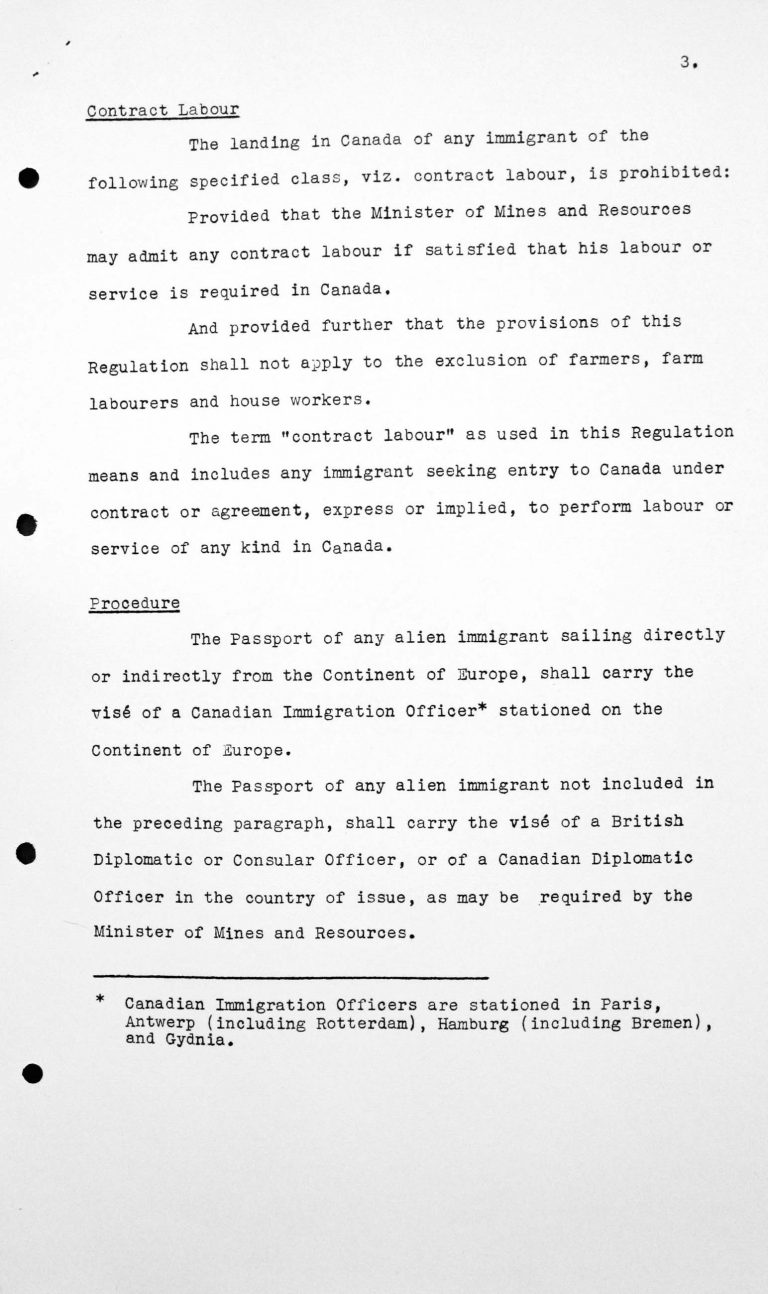
Report for the Technical Sub-Committee on Canadian immigration regulations applicable to immigrants proceeding to Canada from countries on the continant of Europe, July 8, 1938, p. 3/3
Franklin D. Roosevelt Library, Hyde Park, NY
Report for the Technical Sub-Committee on Canadian immigration regulations applicable to immigrants proceeding to Canada from countries on the continant of Europe, July 8, 1938, p. 3/3
Franklin D. Roosevelt Library, Hyde Park, NY
